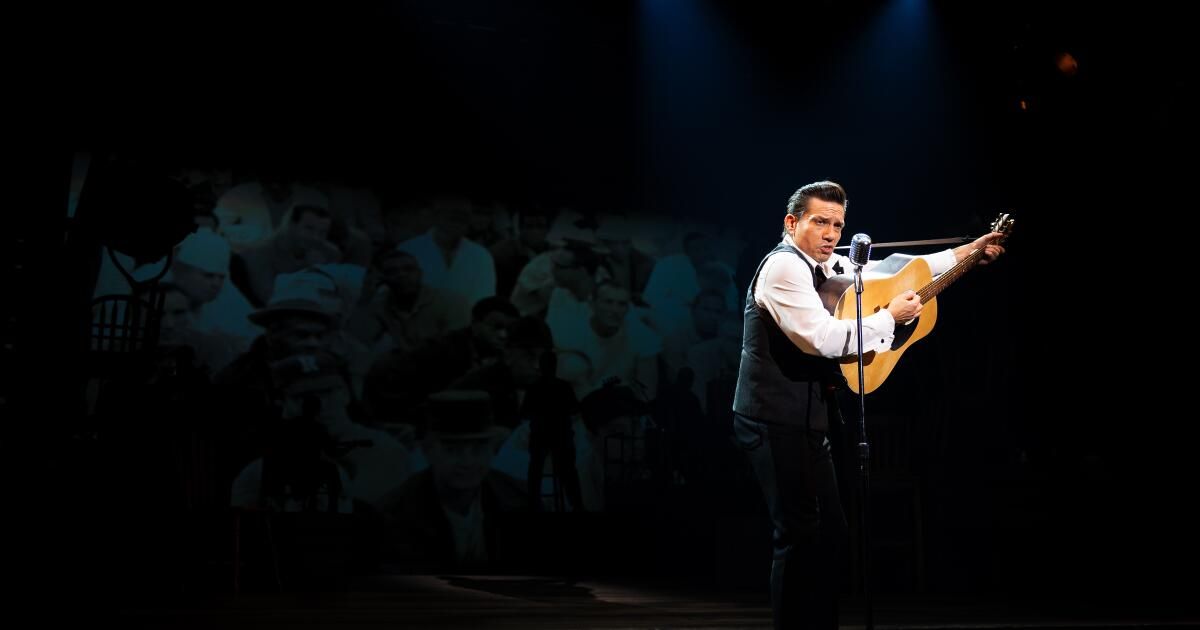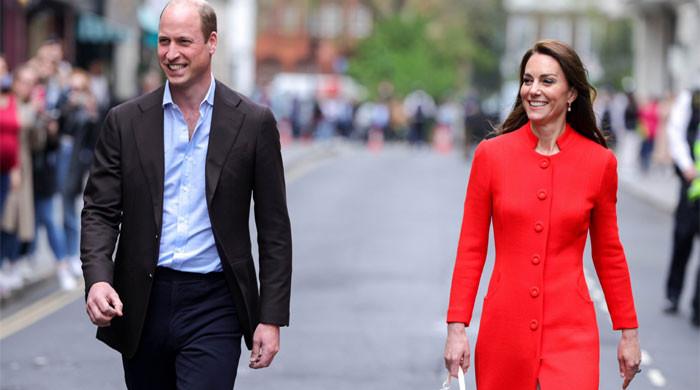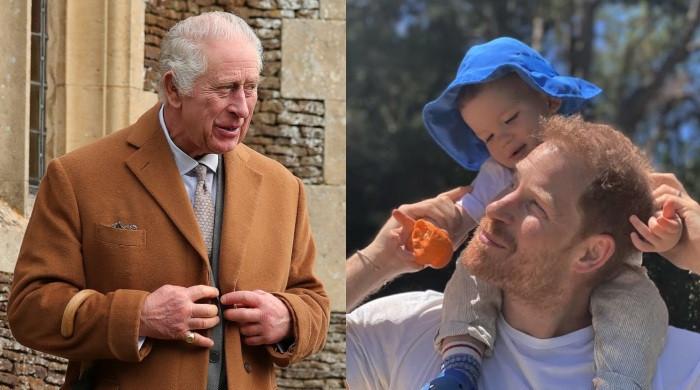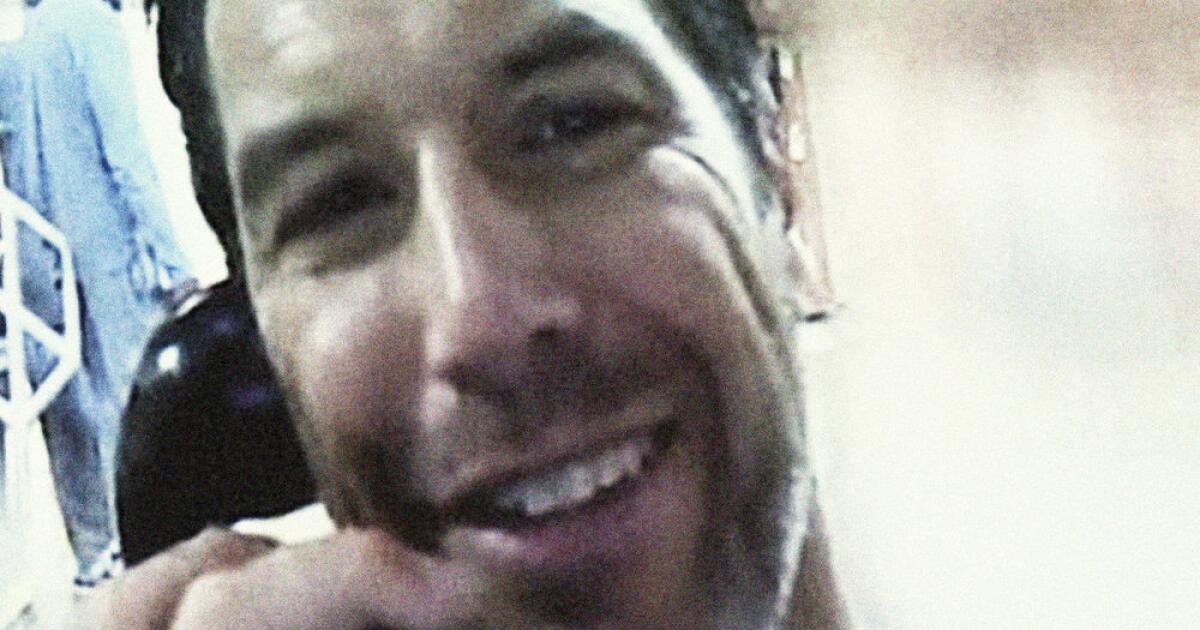Toward the end of the new stage show “The Ballad of Johnny and June,” John Carter Cash cautiously approaches his mother, June Carter Cash, to talk about a treatment center for drug and alcohol rehab. But not for the sake of his father, Johnny Cash, whose substance abuse problems They were widely known and well documented.
“You know it's a family disease,” he explains. “I think you need to look at your own relationship with pills.”
“During our first performance, I thought, 'Oh my God, what if they don't believe it's true because they've never heard of it before?'” Patti Murin, who plays June, said of the scene. “They might even think we're trying to exaggerate something for the sake of the story, or to give June more of a part of the narrative or all that.”
But the show's description is based on real events: John Carter Cash, who first revealed his mother's substance abuse in his 2007 biography, “Anchored in Love: The Life and Legacy of June Carter Cash,” discussed the topic in detail with the musical's creators during its more than six years of development. And while “The Ballad of Johnny and June,” which has its world premiere at La Jolla Playhouse through July 7, chronicles the country music couple's legendary love story and recreates duets like “Jackson.” and “If I were a carpenter,” centers addiction in a way that few major musicals do.
“The moment [John Carter Cash] “He told us, 'My mom didn't save my dad, that's a myth, the problems continued,' and we realized he didn't want the fairy tale, he wanted the truth,” said director Des McAnuff. “That really became the reason for doing this show, because what we also discovered is that the truth is much more interesting than the fairy tale.”
June Carter Cash (Patti Murin), Johnny Cash (Christopher Ryan Grant) and John Carter Cash (Van Hughes) in “The Ballad of Johnny and June.”
(Rico Soublet II)
Historically, characters under the influence of stage musicals are either brought into fleeting focus, for comic or dramatic effect, or framed as fallen, even evil, wayward figures. (A recent exception: “Days of wine and roses” the somber, alcohol-fueled romance that played briefly on Broadway earlier this year).
“Addiction is a disease.but it has not been portrayed accurately,” he said playwright Sean Daniels, who directs Florida Studio Theater's Recovery Project and Live Tampa Bay's Anti-Stigma Initiative. “Somehow, we're taught that people only have a problem after they've been stumbling or when they hit rock bottom and crash their car. That's a very old way of talking about it; that's the version of representing cancer as someone coughing up blood into a tissue, so we know they're going to die.
“The arts have proven effective in changing national narratives, as we've seen in conversations about issues like gay marriage,” he continued. “If you see your favorite musicians fight with [addiction] and finding a way to do so inspires you to seek help or even just ask more questions, not only is it a fantastic piece of theater but it really does it great justice. Programs like this can save lives.”
McAnuff and Robert Cary, who previously collaborated on La Jolla Playhouse's “Summer: The Donna Summer Musical” and “Palm Beach,” sharpened the show's focus after numerous candid interviews with John Carter Cash, who wanted to honor his parents' legacy. and at the same time be honest about your dependencies.
“The sensationalism in the media and the exploitation of addiction is something that turns my stomach,” said Cash, also a recovering addict. “But everything in the play that is sensitive or whatever is something that my father and mother were willing to talk about. “They weren’t afraid to make their struggles known, especially if it could help other people.”
“We're celebrating the lives of these two brilliant artists,” said Van Hughes, who plays John Carter Cash, both character and narrator, in the production. “But we're also trying to show how a relationship that involves addiction has three parts: the two people and the addiction.”
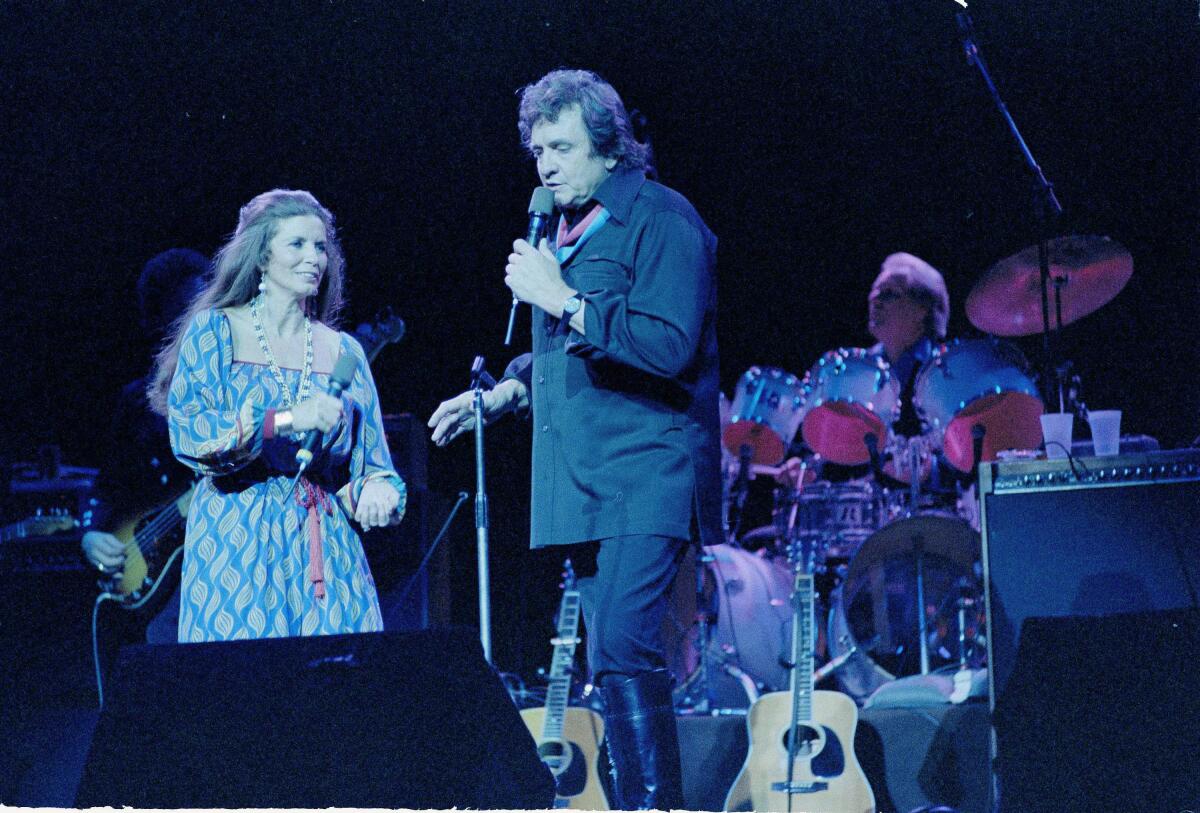
Johnny Cash and June Carter Cash perform at Radio City Music Hall in 1985.
(Ron Frehm / Associated Press)
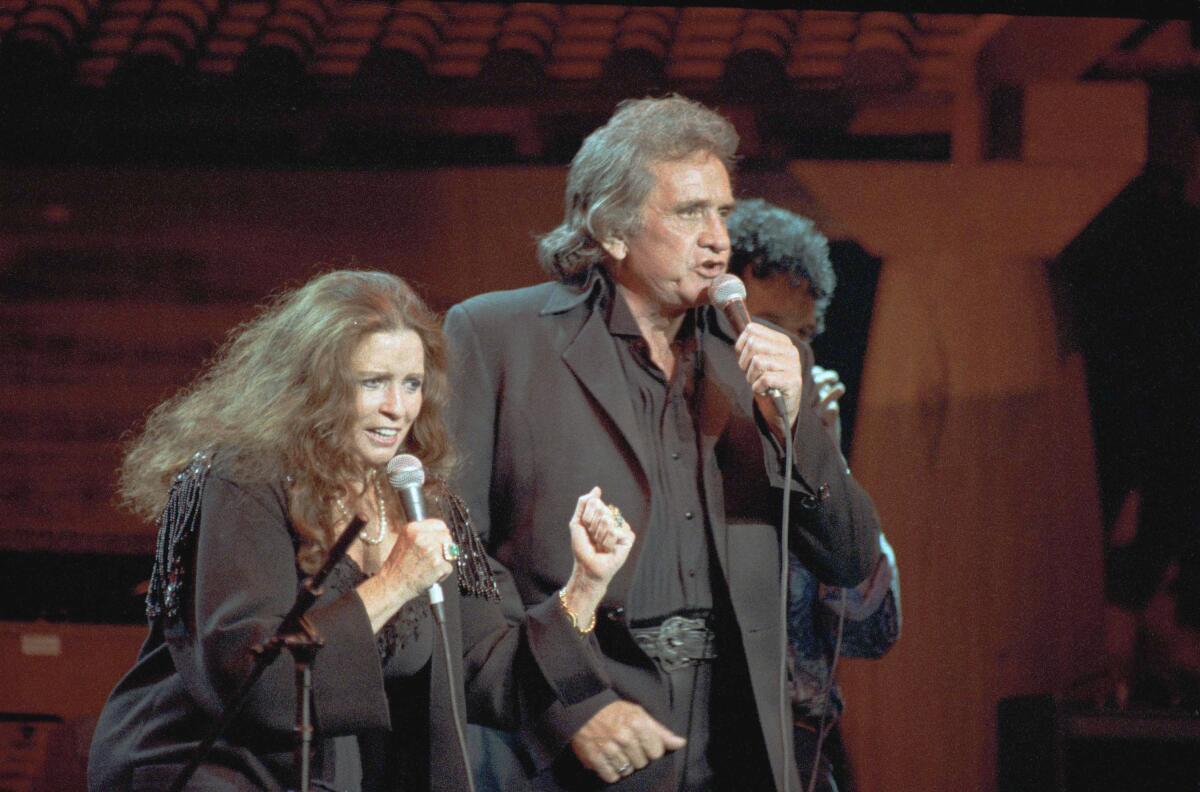
Johnny Cash and June Carter Cash perform at Madison Square Garden in 1992.
(Ron Frehm / Associated Press)
“The Ballad of Johnny and June” balances entertaining recreations of memorable performances like “Ring of Fire,” “Walk the Line” and “Folsom Prison Blues” with scenes that add up to a more accurate and authentic depiction of the disease. For example, Johnny Cash is rarely seen in a stereotypical drunken state. Instead, actor Christopher Ryan Grant, who plays the musician, plays him more subtly, an effect that keeps the audience in the dark about how intoxicated Cash might be at any given moment.
“[McAnuff] He gave me that note because he said, 'The most convincing thing an alcoholic does is try to maintain his sobriety in public,'” Grant said. “He made me rethink the whole show and the pressure he must have felt to continue performing without falling apart.”
Likewise, the musical challenges the common perception that addiction is a moral failing that requires judgment or punishment. This is particularly true in the scenes in which June appears, including her realization that many of her family members also battled the disease.
“We live in a culture where men are allowed to behave badly in ways that are almost celebrated, as if it's a sign of them being warriors rampaging through the world,” said Cary, who co-wrote the book with McAnuff. “But when a woman suffers from some of the same demons, the expectations for how she is allowed to behave are quite different. We want to dignify her humanity: she is a human being, as opposed to a saint who swoops in and saves Johnny.”
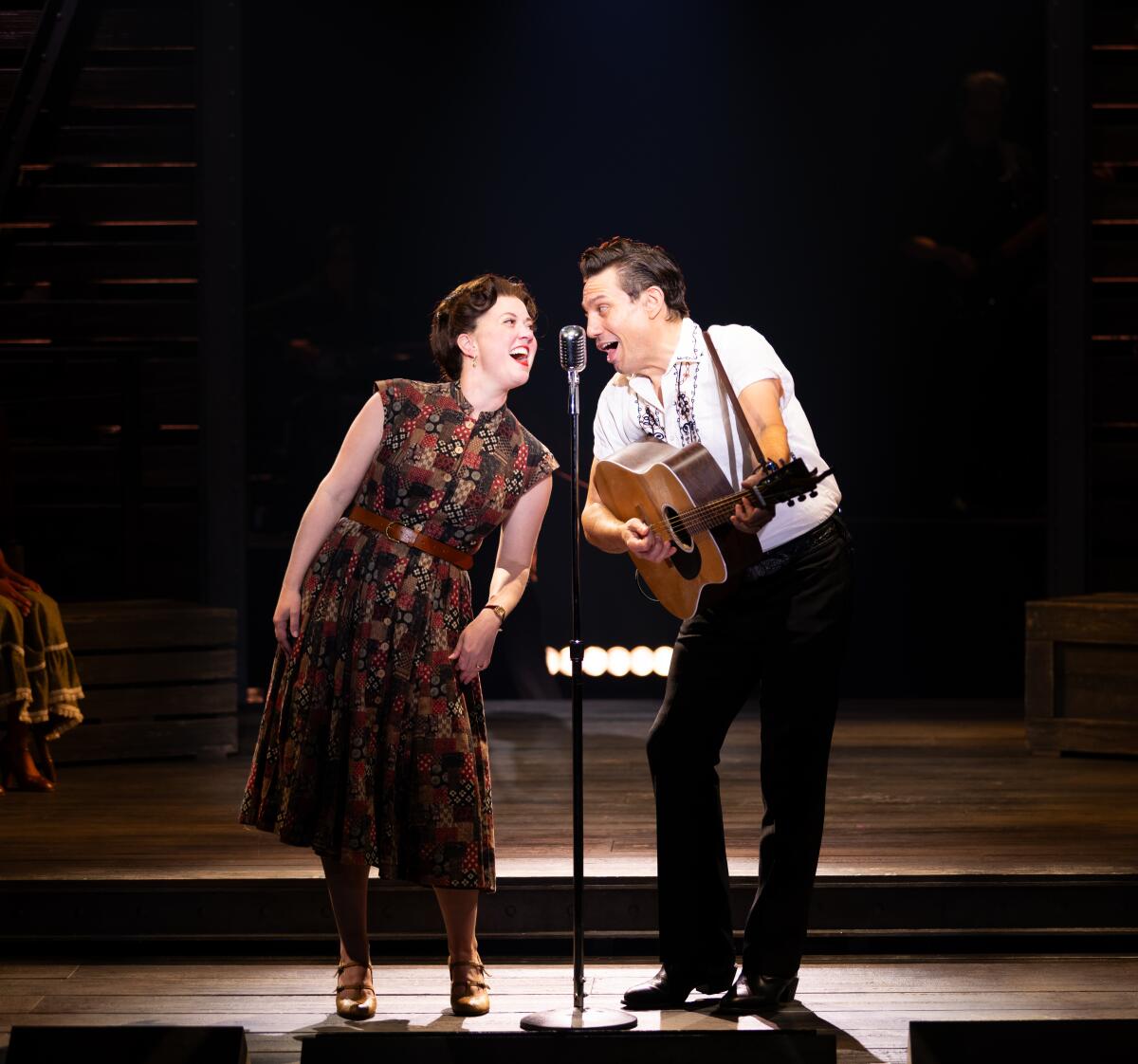
Patti Murin as June Carter Cash and Christopher Ryan Grant as Johnny Cash in La Jolla Playhouse's world premiere production of “The Ballad of Johnny and June.”
(Rico Soublet II)
That “The Ballad of Johnny and June” does not attempt to order the recovery process in time for the final curtain is as useful as any other aspect of its performance. When John confronts his father about what he will do to help his mother, Johnny responds, “You can open a door for someone, but you can't force them through it” and that he “will love her through it.” heart of her.” the failures of hers, the imperfections of hers, the way she loved me through mine.”
“We want to be responsible in how we describe these relationships,” McAnuff said. “His love story is one in which addiction was an obstacle, and I wouldn't say they conquered it because, unfortunately, it is true that controlling this disease is a lifelong quest. But together they kept him at bay.
“If we can tell this story about the Carter and Cash family,” he continued, “hopefully it will affect other families who may not be as famous but are struggling with some of the same nightmarish issues.”
Someone in the family who has already been positively affected: John Carter Cash, who grew up watching Broadway shows with his parents. “I feel like they would be happy with this; it's standalone and unlike anything else that's been done with Johnny and June,” he said.
“I knew it would show their difficulties, but it's important to me that it also show the forgiveness, joy and lasting love that my parents had, and the fact that they stay together, no matter what they went through,” he added. “I hope that people who come to see it find strength in that, in the way they make their music.”
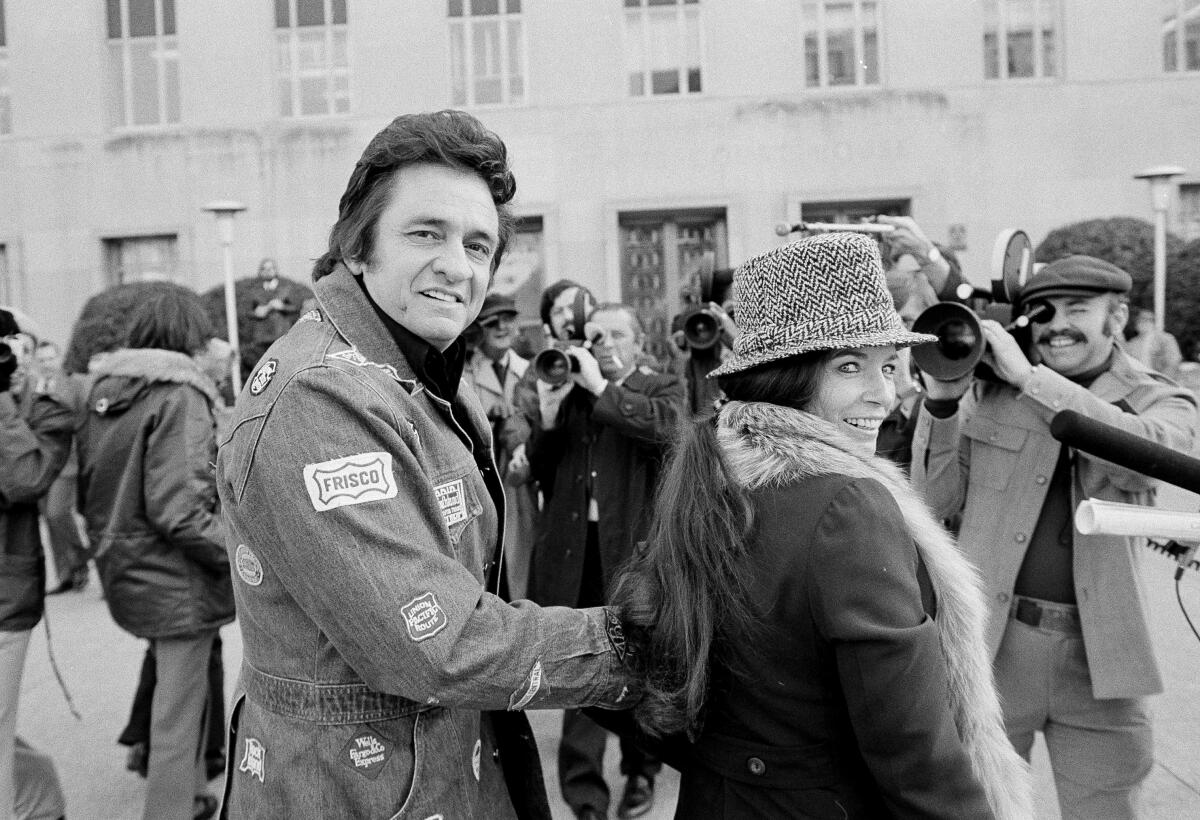
Johnny Cash and June Carter Cash arrive at the United States District Court in Washington to witness the 1974 Watergate cover-up trial. The two were invited by prosecutor James Neal.
(Bob Daugherty/Associated Press)
'The Ballad of Johnny and June'
Where: Mandell Weiss Theater, La Jolla Playhouse, 2910 La Jolla Village Drive, La Jolla
When: 7:30 p.m. from Tuesday to Friday, 2 and 8 p.m. on Saturdays and 1 and 7 p.m. on Sundays. Ends July 7.
Tickets: From $29 (subject to change)
Contact: (858) 550-1010 or lajollaplayhouse.org
Execution time: 2 hours, 30 minutes (a 15-minute intermission)

